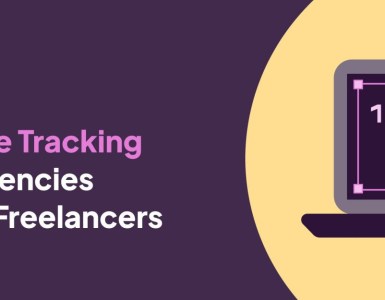Do you need a hire a creative freelancer? Click here to post up a job and top quality freelancers will contact you with their rates.
Who owns IP?
Ask the internet who owns the intellectual property when working with a freelancer? and you’ll get a flurry of opposing views: “The client owns the IP!”, “No, the freelancer!”. It can be confusing when you’re looking for facts.
Unfortunately, there’s no short answer to this question. The answer is invariable, “It depends”.
However, this article will give you all the information you need to avoid any confusion.
What is IP?
IP stands for intellectual property. In short, it’s anything that you create with your mind. This includes writing, ideas, inventions, artistic work, music, symbols, designs – any asset that’s intangible or indefinite. The IP of these assets belongs to whoever originally created them unless they are specifically given away. Hey, it’s even in the US constitution!
What does it depend on?
Well, it depends on whether you’ve put into place a written contract before any work has started. If you have made a contract, the IP will belong to whoever it says it does in your contract. If you need a hand with writing up a contract, check out our complete contract-writing guide.
If you haven’t made a contract, well, abandon all hope ye who enter here. This way arguments, disputes and even lawsuits lie. The official answer is that if there is no contract in place, the IP belongs to the original creator – the freelancer.

But what if the client has paid the freelancer for their work?
This doesn’t make a difference. Money changing hands does not mean that intellectual property rights have changed hands. Unless there is a contract in place that officially states IP rights will pass to the client on completion of the project, then the IP still belongs to the freelancer.
Unless stated differently, when you pay a freelancer for their work you are paying them for the right to use their IP, not to own it.
But the freelancer was working on the client’s project? Surely this means it belongs to them:
Yes, it’s easy to see why a client might think that IP rights automatically belong to them since the freelancer was working on their project or idea. But this is not the case. All work done on their project still belongs to the freelancer unless stated otherwise.

Why do I need to own IP rights anyway?
As a client, you often don’t need to own ALL of the IP rights to your freelancer’s work. Of course, this will depend on your project. But, you should always own some. Outright owning all IP rights is overkill and potentially damaging to your freelancer.
Clients can be sceptical of the creative process and often ask for exclusive ownership of all the IP rights related to their project. They’re suspicious that the freelancer will use their work again elsewhere, and want to exercise their control over the freelancer.
It’s even been heard of to ask for any ‘future rights’ that might come into being. This is a major case of paranoia and completely unnecessary. Asking for exclusive ownership of all IP rights to a project is considered bad practice, and you may come up against resistance from your freelancer if you ask for this.
Then, what rights should I own?
Your freelancer should grant you the rights to use their intellectual property in the way that you desire and is necessary for your business. This is different to outright owning IP, but it covers everything you need to use your project in the way that you want. These rights should cover issues such as copyright, commercial use, modification, ownership, and whether or not your rights will expire in the future.
As always, you and your freelancer should discuss these issues before work commences.
You’ll find that different freelancers have different stances when it comes to giving away IP. For example, ‘original’ content creators such as illustrators, photographers or artists will want to control and own most, if not all of their IP. Other professions that mix or combine elements together in their work (such as designers, filmmakers, web developers) will generally take a more relaxed view of IP ownership.
Why is it important for the freelancer to hold onto their IP?
A freelancer’s intellectual property rights are essentially their livelihoods. If you completely own the intellectual property rights to a freelancer’s work, this means they can’t ever use the work again, including in their own portfolios.
Remember that as the client, you own IP rights to your own business or product idea. So if you’re concerned that without transfer of full IP rights from your freelancer, they could go on to use your work or idea elsewhere, this is not the case.

Moral of the story:
Get a contract in place. Before your freelancer starts work on your project, you should both draw up a contract and sign it. Your contract should outline who will own the work after it’s finished, how the work can be used and whether any IP rights will be changing hands. And, if so, what kind of rights will be granted.
What Are The 4 Types Of Intellectual Property Rights?:

There are 4 main types of intellectual property rights, which will allow different levels of control over a piece of intellectual property. These rights can be kept by the original creator, or granted to someone else:
- Retaining All Rights: This means that the original creator of the material will keep ALL rights unless they expressly give or sell those rights to someone else.
- Exclusive Agreement: This means that no one else can hold the rights to the IP. Exclusive agreements must be in writing. A freelancer can sell their IP rights exclusively. This means that they can’t give that piece of IP to anyone else or use it themselves again.
- Non-Exclusive Agreements: This type of agreement means that potentially multiple people can hold the rights to the IP. You will own a licence to use the IP, but this is not exclusive to you. This kind of agreement doesn’t need to be put in writing, but it’s probably best to draw up an agreement anyway, in case anyone gets confused further down the line.
- Bolstering of Non-Exclusive Copyright Licenses: In recent years it’s become possible for non-exclusive copyright licence holders to take legal action against copyright infringements. This is an extra layer of protection for clients who are awarded this kind of licence, as it means they can take action against anyone who infringes on the copyright of the work they own. This is an additional grant and needs to be in writing and signed by both parties.
To hire a creative for your next project, click here.




